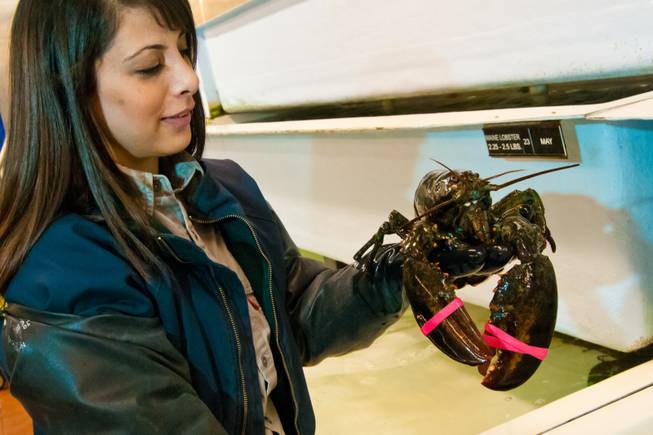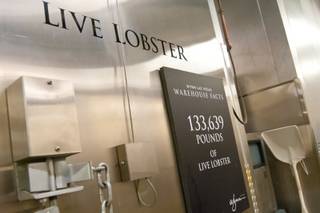
Marine biologist Yasmin Tajik is in charge of live seafood, including lobsters, prawns and crab, at Wynn Las Vegas, May 24, 2012.
Tuesday, May 29, 2012 | 2 a.m.
When Yasmin Tajik took up marine biology, she didn't figure on working in the desert and caring for sea creatures that would soon become someone's dinner.
But that's where her career has taken her — to a chilled cooler filled with saltwater tanks beneath the casino floor of the Wynn Las Vegas resort. It's a hidden world where an array of sea creatures, including about 3,000 lobsters a month, pass through on their way to one of 20 restaurants supplied by Tajik's operation.
"Yes, we sell that many lobsters," she said. "It's like the restaurants are buying out of our warehouse."
At 7 a.m., when many Las Vegas residents at this time of year are deciding how to dress for triple-digit temperatures, Tajik arrives at work and pulls on a jacket to ward off the chill of the cooler. She pushes a button, and two stainless steel doors slide open to reveal tanks with water kept at 40 degrees. She keeps a close eye on the temperatures, because variations can cause problems for the lobsters. She makes her own saltwater with a special marine mix, measuring the acidity and ammonia in the water. She even maintains levels of bacteria that mimic the crustaceans' natural habitat.
There are other tanks in the kitchens at Bartolotta Restaurante di Mare and for the Chinese restaurant Wing Lei.
Besides Maine lobsters, there are crabs, prawns, Mediterranean blue rock lobsters, spiny lobsters, spider crabs, brown crabs, Dungeness crystal crabs and rock cod. Marble goby is the only freshwater fish kept alive for the restaurants.
Tajik didn't expect to end up in Las Vegas when she studied biology at Gustavus Adolphus College in Minnesota. Her pursuit of marine life took her to seaside internships in San Diego and Hawaii. But she landed a job in the Mojave Desert, as an educator for the dolphin habitat at the Mirage.
She got her first taste of working with seafood 10 years ago at the Bellagio, before corporate Executive Chef Grant McPherson lured her to the Wynn, when that resort opened in 2005.
As a marine biologist, Tajik pays attention to issues of sustainability and sea life populations.
"Fortunately, the lobster population is plentiful," she said. "But our chefs also keep an eye on this, and if they see a problem, they would pull back on serving them."
Most seafood restaurants receive fresh lobster and keep them alive in water tanks, but only the Wynn, Caesars Palace and Bellagio have a marine biologist who meticulously maintains the water to keep the crustaceans as fresh as if they were pulled from the ocean and placed on a plate with drawn butter. There are a handful of other marine biologists in Las Vegas, but most work with more traditional aquariums, such as those at Mandalay Bay, the Mirage and Caesars Palace.
"This is more challenging than working at an aquarium, because we have such a turnover," she said. "There is a whole new group that comes in every day."
No one in this city, and practically the world, has exactly the same kind of job Tajik does at the Wynn, however.
She's the woman with the langoustines.
Chef Paul Bartolotta's restaurant at the Wynn is the only one in the Western Hemisphere to serve langoustines — small orange lobsters a few inches long that sell for $20 each on the menu. Only 11 other restaurants in the world have them.
"It is the caviar of crustaceans and there's nothing that tastes like it, with a combination of the delicate sweetness of the meat and the salinity of the ocean," Bartolotta said. "Nothing else has that sweet and salty flavor."
Langoustines, called the true scampi, lose that sweetness when they're frozen. Like their bigger, more famous cousins from Maine, scampi must be kept alive before being cooked. But they do not like to leave their native waters. These langoustines only thrive in silty deep waters off an obscure island somewhere near Siciliy. It took Bartolotta two years to find the distributor sending the scampi to Las Vegas, so the chef guards his source as top secret.
"They are difficult to get to the desert, and they are very, very delicate in nature," Tajik said. "A shift in temperature of five degrees and we start losing them.
"They are unlike the lobsters, which are very hardy creatures."
It took Bartolotta receiving three empty shipping boxes before he and the distributor could figure out the routing and the time it would take to get the langoustines to Las Vegas. He said when he received his first shipment in time for dinner one night a few years ago, more than half died before morning.
"Yasmin really took this seriously, and she did a lot of research," Bartolotta said. "We've now cut our mortality rate to where it's almost negligible.
Tajik works an eight-hour shift, but she's on call 24 hours a day and will go to the shipping dock behind the Wynn to inspect shipments of lobsters and langoustines whenever they arrive. The chefs are often there to meet the packages, too. They take the boxes into her cooler and check out each creature to make sure it arrives alive, healthy and intact.
Shipments arrive in Styrofoam boxes packed with ice, enough to slow down the langoustines' metabolism and put them into a deep sleep for the trip. Maine lobster have similar packing and are wrapped in wet newspaper, Tajik said, to help them hold oxygen in their gills.
It can take anywhere from overnight to 36 hours for lobsters to travel from the ocean to the Wynn shipping dock.
"That's if they don't miss a flight," Tajik said.
Yes, even lobsters sometimes miss their connecting planes.
Tajik's job is to keep the creatures happy.
For a day.
"We want to keep them as stress free as possible," she said with a smile, "before they're killed for dinner."


Join the Discussion:
Check this out for a full explanation of our conversion to the LiveFyre commenting system and instructions on how to sign up for an account.
Full comments policy